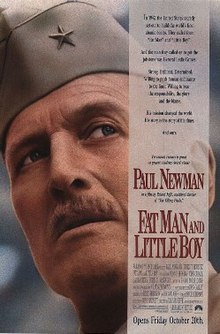Fat Man and Little Boy
| Fat Man and Little Boy | |
|---|---|

Original film poster
|
|
| Directed by | Roland Joffé |
| Produced by | Tony Garnett |
| Written by | Roland Joffé Bruce Robinson |
| Starring | |
| Music by | Ennio Morricone |
| Cinematography | Vilmos Zsigmond |
| Edited by | Françoise Bonnot |
| Distributed by | Paramount Pictures |
|
Release date
|
|
|
Running time
|
127 minutes |
| Country | United States |
| Language | English |
| Box office | $3,563,162 |
Fat Man and Little Boy (a.k.a. Shadow Makers in the UK) is a 1989 film that reenacts the Manhattan Project, the secret Allied endeavor to develop the first nuclear weapons during World War II. The film is named after the weapons "Little Boy" and "Fat Man" that were detonated over Hiroshima and Nagasaki, respectively. The code names, originally Fat Man and Thin Man, were drawn from characters in the works of Dashiell Hammett. However, there's a possible secondary allusion to stout project director Gen. Leslie Groves and the slim scientific director, Dr. J. Robert Oppenheimer. The film focuses much attention on the frequently strained relationship between the two men.
The film was directed by Roland Joffé and written by Joffe and Bruce Robinson.
In September 1942, U.S. Army Corps of Engineers General Leslie Groves (Paul Newman) who oversaw construction of the Pentagon is assigned to head the ultra-secret Manhattan Project, to beat the Germans in building an atomic bomb.
Groves picks University of California, Berkeley physicist J. Robert Oppenheimer (Dwight Schultz) to head the team of the project. Oppenheimer was familiar with northern New Mexico from his boyhood days when his family owned a cabin in the area. For the new research facility, he selects a remote location on top of a mesa adjacent to a valley called Los Alamos Canyon, northwest of Santa Fe.
The different personalities of the military men Groves and the scientist Oppenheimer often clash in keeping the project on track. Oppenheimer in turn clashes with the other scientists, who debate whether their personal consciences should enter into the project or whether they should remain purely researchers, with personal feelings set aside.
...
Wikipedia
